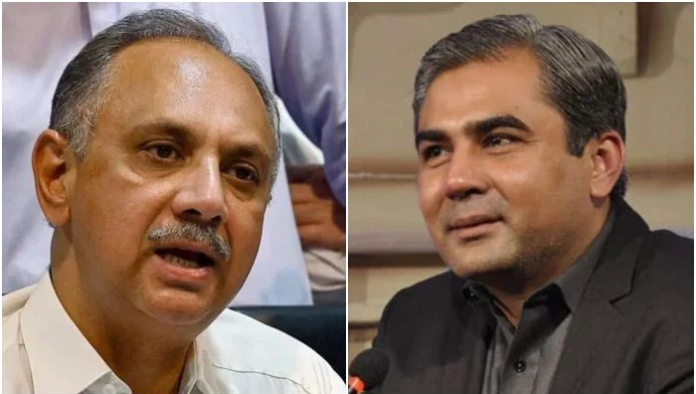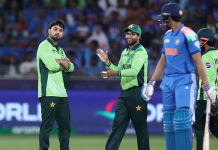SARGODHA, FEB 25 (DNA): Pakistan’s early exit in the ongoing Champions Trophy 2025 has not only drawn widespread criticism against players but also landed Pakistan Cricket Board (PCB) Mohsin Naqvi in hot waters over the team’s early exit from the tournament.
Speaking to the media on Tuesday, National Assembly Opposition Leader Omar Ayub called for Naqvi to be held accountable and demanded his removal as the PCB head over “repeated failures”.
The Pakistan Tehreek-e-Insaf (PTI) politician’s remarks come against the backdrop of Green Shirt’s poor run in the mega-event — the first International Cricket Council (ICC) event to be hosted by the country in 29 years — which saw them lose the opening match against New Zealand in Karachi.
Despite fans’ expectations for the home team to perform well, the Mohammad Rizwan-led side failed to put up a notable performance and subsequently lost against arch-rivals India on February 23 in Dubai.
With back-to-back losses on the cards, the Men in Green’s progression in the Champions Trophy depended on the outcomes of other teams’ matches.
However, this door was effectively closed after New Zealand beat Bangladesh on Monday resulting in the hosts, also the defending champions, being eliminated from the tournament. The team will now face Bangladesh at Rawalpindi Cricket Stadium on February 27.
This isn’t the first mega-tournament that Pakistan have performed poorly at. The national side, in 2023, only managed to win four out of their nine matches and finished on fifth position on the points table with eight points in the ODI World Cup 2023.
The Green Shirts then also crashed out of the T20 World Cup 2024 which saw them losing to India as well as the United States.
What went wrong?
Pakistan’s disappointing run in the Champions Trophy 2025 did not arise out of mere bad luck but in fact, seems to be an amalgamation of varying reasons and factors, which together resulted in the team’s elimination.
Uncertainty
Rizwan was appointed white-ball skipper in October last year and led Pakistan to an impressive 2-1 ODI win over world champions Australia — their first series victory in 22 years in the country.
They also won in Zimbabwe and inflicted on South Africa their first home whitewash, with a 3-0 scoreline.
But fast-rising opener Saim Ayub injured his ankle during a subsequent Test in South Africa.
Pakistan delayed the announcement of their Champions Trophy squad until the deadline to wait on Ayub’s fitness but the left-hander failed to recover.
To add to the home team’s woes, fellow opener Fakhar Zaman was ruled out of the rest of the tournament after the first match — a 60-run defeat to New Zealand — with a muscle injury.
Green Shirts’s much-vaunted pace attack of Shaheen Afridi, Naseem Shah and Haris Rauf — rested from the Test series to keep them fresh — looked rusty and failed to control the deathovers.
Poor team selection
Selectors resisted calls from former players and pundits to include a second spinner in the 15-man squad and instead chose only one in Abrar Ahmed.
They relied on part-time spinners Salman Agha and Khushdil Shah, who have managed just one wicket between them in two matches.
Pakistan also erred by not selecting a regular opener and took the risky step of promoting out-of-form Babar Azam to partner Zaman.
When Zaman was ruled out they brought in Imam-ul-Haq as a replacement. He made just 10 as Pakistan were crushed by title favourites India by six wickets.
In a surprise move, they included in the squad all-rounders Khushdil and Faheem Ashraf on the basis of their performances in Bangladesh’s Twenty20 league.
Ashraf had not played an ODI for two years and Khushdil for three.
Former captain and television pundit Rashid Latif called it a “political selection”, blaming outside influence.
Obsolete approach
Former skipper and popular all-rounder Shahid Afridi accused Pakistan of playing outdated cricket.
“In 2025 Pakistan was playing the cricket style of the 1980s and 1990s while other teams had progressed well to adopt an aggressive and modern style,” he told AFP.
“The ailment of playing too many dot balls also hurt our game.”
Pakistan played 152 dot balls against India scoring 241 in 49.4 overs, including a record 28 balls with no scores in the first six overs.
Their total of 260 in 47.2 overs in the defeat to New Zealand had 162 dot balls.
“The mindset of Pakistan players does not match with modern-day cricket,” said Afridi.
“We need a complete overhaul of the system so that we can produce players with an aggressive mindset.”

















